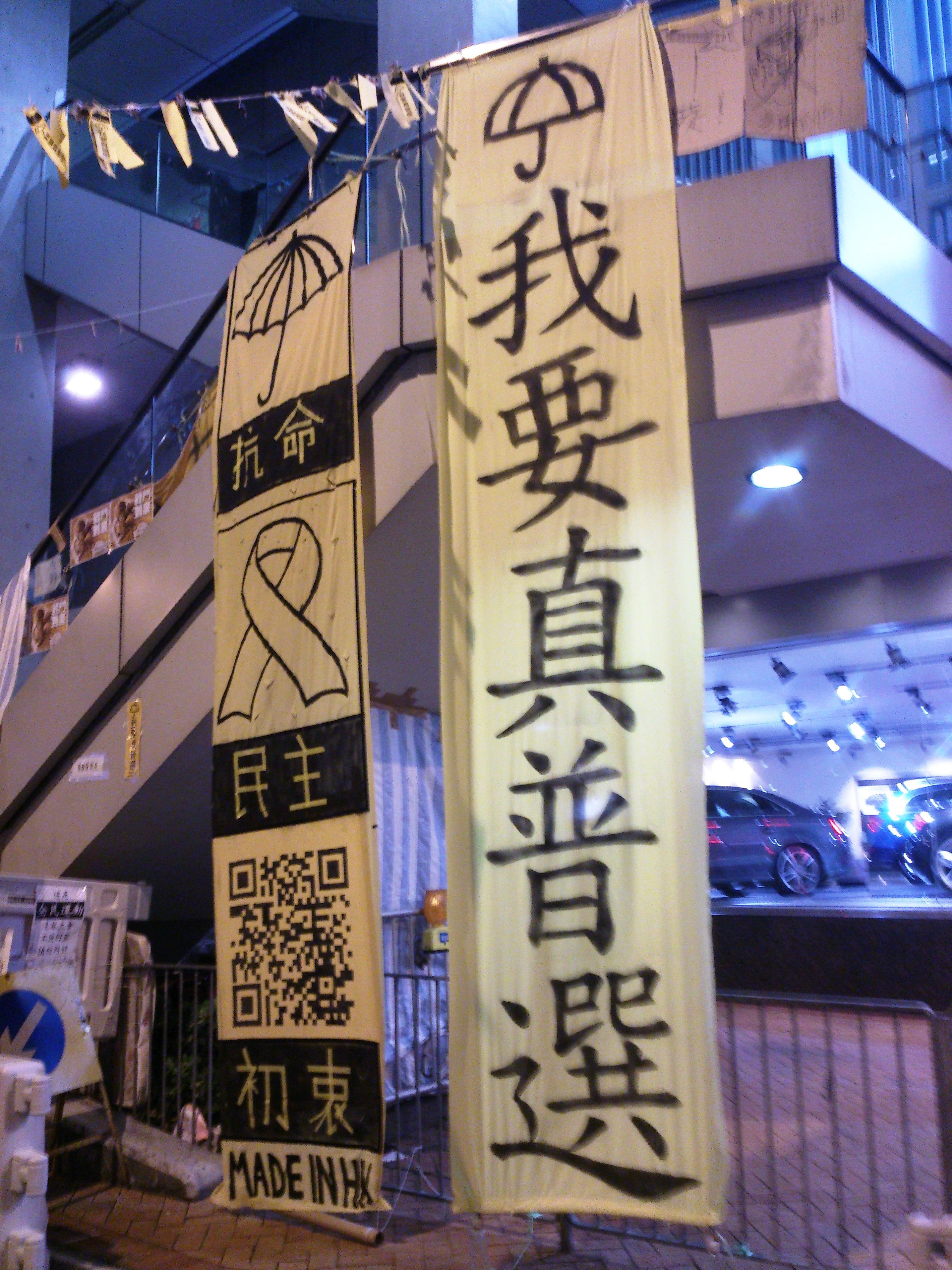How the Recent Hong Kong-China Soccer Match Shows Further Strain with the Mainland
by Justin Kwan
語言:
English
Photo Credit: Fuzzy Gerdes/Flickr/CC
ALTHOUGH THE display of nationalistic sentiments is not a new concept to the sporting world, recent sports matches in Hong Kong highlight the tense relationship between Hong Kong and China in light of changing political realities. This past October, the Hong Kong Football Association (HKFA) was fined 5,000 Swiss francs (approximately $5000 USD or HK$39,000) after soccer fans booed the Chinese national anthem at the 2018 FIFA World Cup qualifying matches in Asia between Hong Kong and Qatar. Despite the warning, the actions continued at the second match between Hong Kong and China which took place last month. Hong Kong citizens booed March of the Volunteers, which is the national anthem for both the Hong Kong Special Administrative Region (HKSAR) and the People’s Republic of China (PRC). During the most recent match, Hong Kong fans displayed a variety of messages such as “Hong Kong is not China” as well as “support your own people” in addition to some gestures of profanity.
With the return of Hong Kong to China under “One Country, Two Systems” (OCTS) in 1997, Hong Kongers are placed in an interesting scenario. While technically a Special Administrative Region (SAR) of the People’s Republic of China, Hong Kong still maintains its own sports team in international events under Chapter 7, Article 151 of the Basic Law which states:
“The Hong Kong Special Administrative Region may on its own, using the name “Hong Kong, China”, maintain and develop relations and conclude and implement agreements with foreign states and regions and relevant international organizations in the appropriate fields, including the economic, trade, financial and monetary, shipping, communications, tourism, cultural and sports fields.”
In this sense, Hong Kong has maintained its autonomy as an independent entity from China guaranteed under the constitutional arrangements of the Hong Kong Basic Law. However, segments of the population have been met with frustration. Namely, Hong Kongers’ are frustrated by Hong Kong’s shrinking autonomy – in everything from book censorship to the recent sale of South China Morning Post (SCMP) to Alibaba, to the controversy over the blocking of University appointments in the region’s universities. Since the Umbrella Movement in 2014, Hong Kong youth have expressed their dissatisfaction with the central government for being unwilling to implement reforms for “true universal suffrage” through the direct election of the Chief Executive.
 Photo credit: Wikimedia
Photo credit: Wikimedia
Since the implementation of the Individual Visit Scheme (IVS) in 2003, a policy aimed at revitalizing Hong Kong’s tourism industry after the SARS crisis, the amount of Chinese tourists entering Hong Kong has rapidly increased. The increasing “Mandlandization” of Hong Kong in both the economic and the political sphere over the past decade has given birth to several localist groups, a virtually unheard of position 15 years ago. In an era where Hong Kong autonomy is shrinking, the localism movement has sought to better protect local identity and culture. Everything from the rise of Scholarism and their mandate to protest the implementation of “Moral and National Education” to the attempt last month by Civic Party lawmaker Claudia Mo to pass an “anti-mainlandization” bill aiming to “defend local history and culture from the influence of mainland China” represents the various interests advocated under the protection for local Hong Kong autonomy.
The most recent soccer match, however, created a rivalry between both groups through a “Hong Kong versus China” dichotomy. While Hong Kong’s political status acknowledges its legal status subordinate to the PRC, the social discontent expressed at these games is more reflective of the recent tensions between Hong Kong citizens and the central government in Beijing.
But the booing of the Chinese national anthem should not have come as a surprise. The Chinese University of Hong Kong’s research on “Identity and National Identification of Hong Kong People” in 2014 revealed in a survey that only 31.8% of respondents felt proud of the national anthem. Despite lack of pride in the anthem, 53.4% of respondents identified that they could sing the entire Chinese National anthem while only 13.9% of people surveyed in Hong Kong had adverse feelings towards it. These results suggest that although many people know the anthem, there is a lack of identification with it as a state symbol for Hong Kong.
Among other political icons surveyed, in comparison to the National anthem, respondents demonstrated even less affection for other symbols including the Hong Kong Central Government Offices (14.3%), Putonghua (17.7%) and the People’s Liberation Army (14.1%). In a place where shrinking autonomy is felt as a threatening force, the imposition of March of the Volunteers as the national anthem (which replaced British anthem God Save the Queen) shows contestation rather than adaptation in the post-colonial Hong Kong environment. State identification with China by way of the Hong Kong Special Administrative Region (HKSAR) is not appealing to a “united under China” narrative.
This level of contestation however should not mean that Hong Kong people reject the notion of “Chineseness” in their own identity. When it comes to cultural Chinese symbols, 50.9% of people felt proud of the Great Wall, which came third to the Night View of Victoria Harbour (65.2%) and Cantonese (58.7%). These results should be considered in conjunction with the latest June 2015 poll from the University of Hong Kong’s Public Opinion Programme which revealed that 36.3% of people identified solely as a Hong Konger while 22.1% identified as solely Chinese. However, the majority of respondents (40.5%) carry a dual sense of identity, identifying as both Hong Kongese and Chinese to varying degrees.
 Photo credit: WikiMedia
Photo credit: WikiMedia
The difficultly in understanding dual identity lies within the question: what defines the Hong Kong identity? The most salient markers have come from a historically strong civic consciousness which has emphasized democracy, rule of law, and a politically transparent and liberal society. Unique cultural aspects such as the former colony’s economic achievements, Cantonese cultural distinctiveness, and democratic values contain distinctive civic and cultural elements that are borrowed from both eastern and western values. Because of this mix, Hong Kong identity has been commonly referred to as “plus-Chineseness”, which suggests that people are not reluctant to accept they are culturally Chinese; their contestation comes from the realm of civic values where democracy, freedom and lifestyle have come to the forefront of creating a distinct culture in Hong Kong which is different from the Mainland.
Beyond soccer matches, Hong Kong citizens continue to face changing political realities. For the general public, the question of national identification is important in resolving conflicting feelings. Since identity is fluid, self-identifying one’s self as Hong Kongese, Chinese or even both is context and circumstance-specific. Within context of the recent soccer match, identification becomes far less blurred when people in Hong Kong are forced to choose between which team they support in a soccer match. Given their choices, it is not surprising that Hong Kong people supported the Hong Kong team when put up against China. However, Professor Sonny Lo also states that “Mainland Chinese Olympics athletes have been regarded as heroes by the people of Hong Kong,” especially after the 2008 Beijing Olympics. Hong Kongers display affection to their own athletes, but they also will support athletes from Mainland China as well. The support for both sides is not contradictory, but demonstrates rather the complexity of the dual identity that Hong Kongers have.
While Hong Kong people acknowledge that the former British Colony is now administered by the PRC, the rise of civic nationalism over the past decade suggests that Hong Kong youth strongly identify with the former and far less with the latter. Thus, the booing of the national anthem by Hong Kong fans signals the tension between the political reality of shrinking autonomy and public desires for more independence. As Professor Francis Lee from the Chinese University of Hong Kong argues, “Hong Kong people reject a process of officially sponsored and politically motivated top-down nationalization. Instead, a process of bottom-up nationalization is going on.” In order to come to a consensus, a resolution that is considered a fair compromise between both the general public and government in both Hong Kong and China is needed. While Beijing has made its position clear, the people of Hong Kong have yet to form a consensus on this issue. Although the last match between Hong Kong and China ended in a 0-0 draw, political compromises between Hong Kong population and elites in Beijing are unfortunately not as simple.


 Photo credit: Wikimedia
Photo credit: Wikimedia Photo credit: WikiMedia
Photo credit: WikiMedia